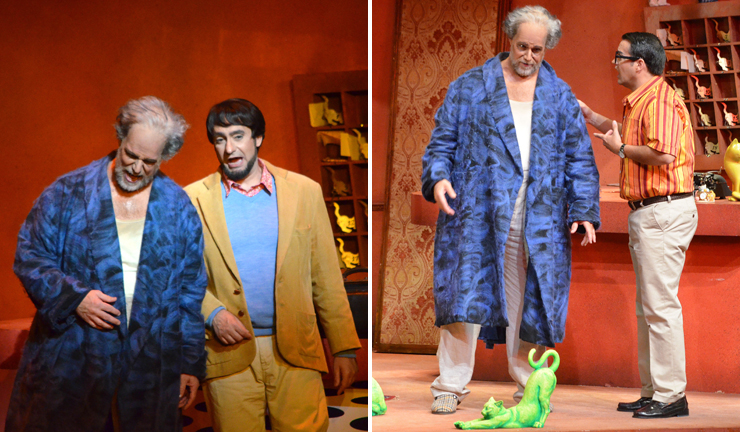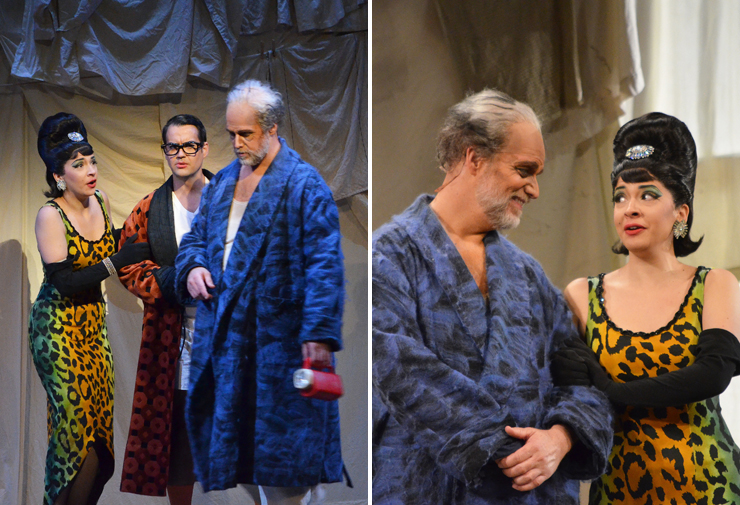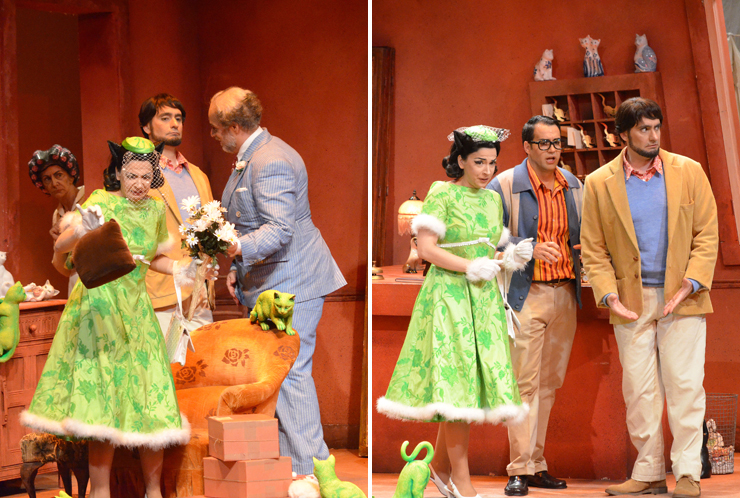“There’s no fool like an old fool, particularly when it comes to love and money.”
That about sums it up for Donizetti’s enduring and durable Don Pasquale. Italian comic opera doesn’t get much better than this.
Speaking of durable, Don Pasquale was one of Donizetti’s 66 operas and was steeped in the bel canto (beautiful singing) operatic tradition. Don Pasquale may be the last popular opera festooned in that style. It is considered Donizetti’s comic masterpiece.

Photo credit is Lorne Grandison for FGO.
The maturing of the operatic art form was percolating in Italy in the 18th century. Opera seria was the dramatic form for royalty and nobility, often featuring gods and heroes, while opera buffa was comedy, made for and portraying common people in common situations. The characters often took on the persona of stock players from the commedia dell'arte; the buffoonish Pantalone becoming Don Pasquale, the overemotional Pierrot as Ernesto, the conniving Scapino being Malatesta and the cunning Columbina as Norina.
Florida Grand Opera’s 75th Anniversary Season featured the big three champions of bel canto, with Donizetti’s Pasquale closing the season out at the Adrienne Arsht Center, after FGO’s terrific productions of Rossini’s Barber of Seville and Bellini’s Norma played earlier.
The rich old bachelor Don Pasquale wants his underemployed nephew Ernesto, his apparent heir, to marry a girl of his choosing. Ernesto is in love with a poor young widow (Norina) and refuses to accept his uncle’s bride choice, much to the Don's displeasure. Pasquale decides to disinherit his nephew and marry in his old age to sire a new heir.
During the overture, a series of black and white stills were projected onto a large screen, supplying the audience with the backstory: Don Pasquale surrounded by cats and being tested for cat allergies; Ernesto kissing his beloved Norina; the rich but geeky bride the Don has chosen for Ernesto and the nephew's unenthusiastic reaction; Ernesto and Dr. Malatesta plotting against his uncle’s plan; Don Pasquale reading a Cat Woman comic book while thinking, “What a beauty!”
The outstanding voices of the evening belonged to bass Kristopher Irmiter (Don Pasquale) and soprano Laura Tatulescu (Norina).

Photo credit is Lorne Grandison for FGO.
Blustery in character and tremendous with his facility for patter (a must for a basso buffo), Irmiter played all the required domineering, confusion and ultimate humiliation with great comic timing and honesty.
Irmiter’s basso was rich and enthusiastic as he navigated the bel canto (“Ah, un foco insolito”), singing of the fire that had suddenly gripped him, and his patter was distinctive and remarkable when singing a duet (“Aspetta, aspetta, cara sposina”) with his physician, Dr. Malatesta (baritone Marco Nisticò), plotting revenge on Norina. Irmiter’s characterizations, from befuddlement to defiance while confronting a decked out Norina (“Signorina, in tanta fretta”) worked well as a result of playing his big voice with true sincerity.
The perky and petite Tatulescu possesses a strong soprano, capable of the soaring runs, flutters and speedy clarity required for Norina. Her musing on how to ensnare a man (“So anch'io la virtù magica”) was delicious, claiming, “…a charm of a smile, a seductive look… are some of the thousand tricks to get my way in life.” Her duets with all three of the men were on the money, Tatulescu adjusting her character to fit the moment and man with whom she was dealing. Announcing that she was ready to carry out their elaborate plan, masquerading as Dr. Malatesta's sister to trick Pasquale into marrying her (“Pronta son; purch'io non manchi”), she and Nisticò matched up nicely for the lively duet. Tatulescu ascended and bloomed into her upper voice as Nisticò coached her on how to act "cat-like," a sexy persona she would exhibit throughout the opera. During the confrontation between Pasquale and Norina, Tatulescu’s detachment and indifference played beautifully against Irmiter’s bewilderment (“Via, caro sposino”), dismissing him with “…go to bed, Grampa,” her splendid runs a high point. She combined effectively with tenor Jesús Álvarez (Ernesto) for the love duet (“Tornami a dir che m'ami”), Donizetti sublimely and beautifully crafting the final intertwined notes with the tenor voice on top and soprano on the bottom.
The diminutive Álvarez, playing Pasquale’s timorous nephew, showed good voice quality but lacked the power needed to sell the two big aria’s Donizetti provided for the character. After being disinherited (“Cercherò lontana terra”), the requisite nuanced lovesickness for Norina was present in Álvarez’s voice, though he seemed to be reaching for his high notes rather than rising commandingly into them. Later, serenading Norina (“Com'è gentil”), Álvarez rendered the aria with a pleasant voice underscored by a solo guitar. Where the tenor had the opportunity to sail the final money note of this aria out of the ballpark, Álvarez hit only a triple.
Nisticò played Pasquale’s physician, the crafty Malatesta, with just the right amount of "over the top." The tall and agile baritone was determined every step of the way, shrewdly manipulating everyone and improvising his way to the happy ending. His resonant voice was an ample match to the other voices, humorous when describing the "angel" he had chosen for Pasquale (“Bella siccome un angelo”), lively in the duet with Norina planning their masquerade for Pasquale (an audience favorite), and keeping up the pattering pace alongside the Don in the plot for revenge on his cheating wife.

Photo credit is Lorne Grandison for FGO.
A couple of quartets were musically rich and well played. During the signing of the marriage contract, the four voices united beautifully in a rich melodious harmony. Now as man and wife, with Norina victorious on every level, a full on quartet laced with voluble patter finished up the romp, as the voices merged harmoniously to the erupting applause of the audience.
All was revealed by the chorus and principals in the final (“La moral di tutto questo”), the humbled Pasquale learning the moral of the story: “He who marries in old age must be soft in the head… fortune doesn't usually go your way.” The voices rose resoundingly as the old bellhop returned with a box containing (wait for it) a puppy, mitigating Pasquale’s cat allergy.
The spirited FGO chorus, playing the penzione staff and guests, were in fine fettle as they bustled about with Norina’s adornments and reveled in the "comings and goings" of the plot, Donizetti setting it with a waltz tempo, perhaps intentionally suggesting that the farce is exactly that – a waltz.
Several cameos were noteworthy: Zachary Elmassian, the amusing notary; Margie Eisenberg, the maid with a cigarette dangling from her lips; Edgar Abréu, the oily cook; Brian James Myer, the vapid bellhop; and Helen Stephens, the old lady guest.
Stage director Renaud Doucet cleverly moved the players to pull off the sleight of hand embedded in the plot. His stage business was creative – a haunting solo trumpet playing while the old bellhop shuffled through his hotel routine, or the chorus entering the fray by way of the frantic ringing of the reception desk bell.
Designer André Barbe set the stage in 1960s Rome in a small hotel, the Penzione Pasquale. The lobby is loaded with cat statuettes and figurines. Around the perimeter of the lobby are laundry lines, which block the view to the street and also cover the second floor, later to reveal a courtyard terrace café. Television antennae sprout from the roof. In Act II, the furniture has been replaced with ultra-modern furnishings.
Barbe dressed Irmiter in baggy pants, a sleeveless undershirt and striped suspenders, a good choice for the proprietor of the funky penzione. Tatulescu transforms from wearing lavender capri pants and pumps to a green and gold leopard print, form-fitting gown, long black gloves, high heels, diamond tiara, dangling earrings and bracelet. Hotel guests wear a variety of 1960s colorful outfits – big hats, tight pants, etc.
Steadfast conductor Ramón Tebar and the reliable FGO Orchestra again delightfully supplied the rich accompaniment.
Don Pasquale
By Gaetano Donizetti; libretto by Giovanni Ruffini and Gaetano Donizetti; conductor, Ramón Tebar; stage director, Renaud Doucet; production, Scottish Opera; sets by André Barbe; lighting by Guy Simard; costumes by André Barbe; chorus master, Katherine Kozak; production stage manager, Liam Roche; FGO general director, Susan T. Danis; adroit observations by Justin Moss.
CAST: Kristopher Irmiter (Don Pasquale), Laura Tatulescu (Norina - May 7, 10, 14), Elena Galván (Norina - May 8, 13), Jesús Álvarez (Ernesto - May 7, 10, 14), Daniel Bates (Ernesto - May 8, 13), Marco Nisticò (Dr. Malatesta), Zachary Elmassian (A Notary).
Schedule | Don Pasquale
Sung without amplification in Italian with projected translations in English and Spanish
Miami Adrienne Arsht Center / Ziff Ballet Opera House
May 7, 8, 10, 13, and 14, 2016
You can order opera tickets at www.FGO.org, or by calling FGO’s Box Office at 800-741-1010, Monday–Friday, 10 a.m. to 4 p.m.
 MAIN MENU
MAIN MENU

